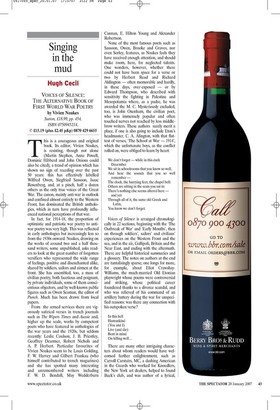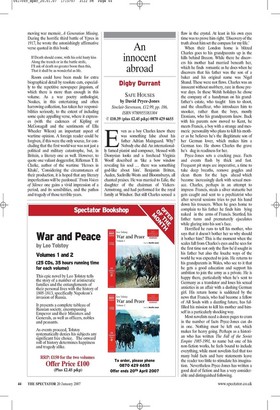Singing in the mud
Hugh Cecil VOICES OF SILENCE: THE ALTERNATIVE BOOK OF FIRST WORLD WAR POETRY by Vivien Noakes Sutton, £18.99, pp. 454, ISBN 0750945214, © £15.19 (plus £2.45 p&p) 0870 429 6655 This is a courageous and original book. Its editor, Vivien Noakes, is resisting, though not alone (Martin Stephen, Anne Powell, Dominic Hibberd and John Onions could also be cited), a trend of opinion which has shown no sign of receding over the past 50 years: this has effectively labelled Wilfred Owen, Siegfried Sassoon, Isaac Rosenberg, and, at a pinch, half a dozen others as the only true voices of the Great War. The canon, mainly anti-war in outlook and confined almost entirely to the Western Front, has dominated the British anthologies, which in turn have profoundly influenced national perceptions of that war.
In fact, for 1914-18, the proportion of optimistic and patriotic war poetry to antiwar poetry was very high. This was reflected in early anthologies but increasingly less so from the 1930s onward. Noakes, drawing on the works of around two and a half thousand writers, some unpublished, asks readers to look at the great number of forgotten versifiers who represented the wide range of feelings, positive and disenchanted alike, shared by soldiers, sailors and airmen at the front. She has assembled, too, a mass of civilian poetry, both facetious and poignant, by private individuals, some of them conscientious objectors, and by well-known public figures such as Owen Seaman, the editor of Punch. Much has been drawn from local papers.
From the armed services there are vigorously satirical verses in trench journals such as The Wipers Times and Aussie and, higher up the scale, works by competent poets who have featured in anthologies of the war years and the 1920s, but seldom recently: Leslie Coulson, J. B. Priestley, Geoffrey Dearmer, Robert Nichols and A. P. Herbert. Particular favourites of Vivien Noakes seem to be Louis Golding, E W. Harvey and Gilbert Frankau (who himself contributed to trench magazines) and she has spotted many interesting and unremembered writers including E W. D. Bendall, May Wedderburn Cannan, E. Hilton Young and Alexander Robertson.
None of the most famous poets such as Sassoon, Owen, Brooke and Graves, nor even Sorley, features, as Noakes feels they have received enough attention, and should make room, here, for neglected talents. One wonders, however, whether there could not have been space for a verse or two by Herbert Read and Richard Aldington — often memorable and hardly, in these days, over-exposed — or by Edward Thompson, who described with sensitivity the fighting in Palestine and Mesopotamia where, as a padre, he was awarded the M. C. Mysteriously excluded, too, is John Oxenham, the civilian poet, who was immensely popular and often touched nerves not reached by less middlebrow writers. These authors surely merit a place, if one is also going to include Eton's headmaster, C. A. Alington, with that flattest of verses, 'The School at War — 1914', which the unfortunate boys, as the conflict rolled on, were obliged to learn by heart: We don't forget — while in this dark December We sit in schoolrooms that you know so well, And hear the sounds that you so well remember — The clock, the hurrying feet, the chapel bell: Others are sitting in the seats you sat in: There's nothing else seems altered here — and yet Through all of it, the same old Greek and Latin, You know we don't forget.
Voices of Silence is arranged chronologically in 22 sections, beginning with the 'The Outbreak of War' and 'Early Months', then on through soldiers', sailors' and civilians' experiences on the Western Front and the sea, and in the air, Gallipoli, Britain and the Near East, and ending with the aftermath. There are helpful historical summaries and a glossary. The notes on authors at the end are tantalisingly sparse; one longs for more, for example, about Eliot CrawshayWilliams, the much-married Old Etonian playwright whose poems were controversial and striking, whose political career foundered thanks to a divorce scandal, and who was relieved of his command of an artillery battery during the war for unspecified reasons: was there any connection with his outspoken verse?
In this hell Humankind (You and I) Live (and die) Bent in mind On killing well...
There are many other intriguing characters about whom readers would have welcomed further enlightenment, such as Carroll Carstairs, MC, a dashing American in the Guards who worked for Knoedlers, the New York art dealers, helped to found Buck's club, and was author of a lyrical, moving war memoir, A Generation Missing. During the horrific third battle of Ypres in 1917, he wrote the astonishingly affirmative verse quoted in this book: If Death should come, with his cold hasty kiss Along the trench or in the battle strife, I'll ask of death no greater boon than this, That it shall be as wonderful as life.
Room could have been made for extra biographical detail by resolute cuts, especially to the repetitive newspaper jingoism, of which there is more than enough in this volume. As a war poetry anthologist, Noakes, in this entertaining and often harrowing collection, has taken her responsibilities seriously, to the extent of including some quite appalling verse, where it expresses (with the cadences of Kipling or McGonagall and the sentiments of Ella Wheeler Wilcox) an important aspect of wartime opinion. A foreign reader could be forgiven, if this were the only source, for concluding that the first world war was not just a political and military catastrophe, but, in Britain, a literary one as well. However, to quote one valiant doggerelist, Rifleman T. B. Clarke, author of the wartime 'Heroes in Khaki', 'Considering the circumstances of their production, it is hoped that any literary imperfections will be pardoned.' From Voices of Silence one gains a vivid impression of a period, and its sensibilities, and the pathos and tragedy of those terrible years.






















































 Previous page
Previous page